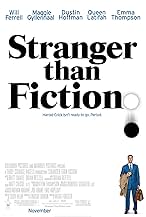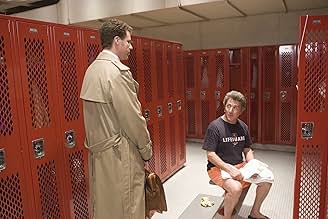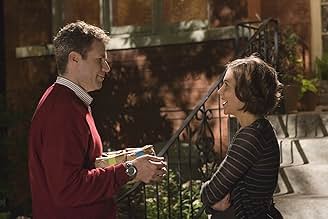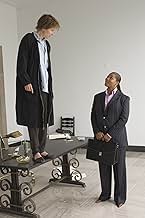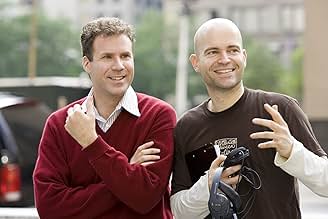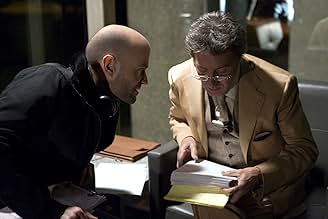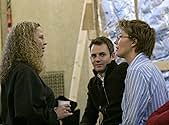I.R.S. auditor Harold Crick suddenly finds his mundane Chicago life to be the subject of narration only he can hear: narration that begins to affect his entire existence, from his work to hi... Read allI.R.S. auditor Harold Crick suddenly finds his mundane Chicago life to be the subject of narration only he can hear: narration that begins to affect his entire existence, from his work to his love life to his death.I.R.S. auditor Harold Crick suddenly finds his mundane Chicago life to be the subject of narration only he can hear: narration that begins to affect his entire existence, from his work to his love life to his death.
- Awards
- 3 wins & 15 nominations total
- Director
- Writer
- All cast & crew
- Production, box office & more at IMDbPro
Featured reviews
Such a theme is usually simplified and subsumed into religious-based tales such as It's a Wonderful Life, but taken as an idea in its own right it has considerable intellectual weight. Harold Crick finds himself the main character in a story as it unfolds, but his annoyance quickly shifts gear as he is aware of the author saying, "Little did he know . . . it would lead to his imminent death."
Not the mindless comedy that the trailer suggests, Stranger Than Fiction is a precise and fairly cerebral story where the laughs stem more from individually appreciating certain aspects of its cleverness rather than any contrived humour.
The surface story is of a man who lives a humdrum if 'successful' life and is awakened to a more three dimensional existence by falling in love. The additional elements will either delight or annoy. IRS auditor Crick (Will Ferrell) starts hearing a voice in his head. It is that of Kay Eiffel (Emma Thompson), a famous author. She describes exactly what he is doing but with a rather better vocabulary than he possesses. When she announces his imminent death, he takes drastic steps to meet her and persuade her to change the ending of her novel.
The characterisation, casting and acting is spot-on. Thompson is at her most refreshingly deranged as the harassed and reclusive author. With a literary equivalence of method acting, Eiffel balances on the edge of her desk trying to imagine the thoughts of someone about to make a suicide jump. She sits in the freezing drizzle watching cars cross a bridge to imagine an accident. Her rants at her 'editorial assistant' (who uses more traditional methods of accessing imagination) give a convincing insight into the creative process. While the voice in Crick's head is stereotypical Thompson, the fuller, isolated character, when we meet her, is a minor revelation. "I don't need a nicotine patch," she declaims angrily to her assistant. "I smoke cigarettes."
Maggie Gyllenhaal, as law drop-out turned baker Ana Pascal, sparkles, glows and is sexily alluring and radiant with passionate love of life - and she manages to light up the screen faster than, say, even Juliette Binoche in Chocolat. Dustin Hoffman has the least challenging of the main parts, but he endows his character (an eminent professor of literature) with the gravitas needed to take ideas of literary interconnectedness seriously. Will Ferrell gives a remarkable break-out performance in a straight role, reminiscent of Jim Carrey in The Truman Show. He is superbly suited to the part as audiences expect him to be a shallow comedy character and here he is trying the find the substantial person inside himself. Most of the audience are concentrating so much on the film's intricate hypothesis and how it is worked out, that only afterwards do we realise what a range of emotions Ferrell has to portray with complete seriousness.
Novelist Kay Eiffel (Thompson) anthropomorphises things like Crick's watch (similarly the official website says, in real time, "As the cursor waited anxiously for the site to load, it couldn't help but feel an overwhelming sense of elation.") We sense a life-imbuing process that might even be likened to what an actor does with his character; but the film goes a stage further by drawing a similarity with the essentially lifeless, clockwork existence of the IRS auditor whose only escape is discovering love with Pascal. His quest is aided by fictional plot analysis from Professor Jules Hilbert (Dustin Hoffman) and of course begs the question, what is fiction?
Director Marc Forster showed consummate skill in portraying the positive escapism of JM Barrie's creative Peter-Pan-writing in Finding Neverland. With Stranger Than Fiction, he has teamed up with brilliant new dramatist Zach Helm. Helm is fascinated with the writing process in what he calls a larger Post-Modern movement. "From Pirandello, to Brecht, to Wilder, to Stoppard, to Woody Allen to Wes Anderson, we can see the progression of a contemporary, self-aware, reality-bending and audience-involving wave in dramatic literature," he says. "I love to see Homer Simpson reacting to his creator, Matt Groenig, or the cast of 'Urinetown' complaining from the stage about their own title."
Even the street names, business names, and the characters' last names of Stranger Than Fiction are significant Crick, Pascal, Eiffel, Escher, Banneker, Kronecker, Cayly, etc. are all puns on mathematicians who focused on the innate order of things. The invitation is to ask what is beyond the symmetry of things.
Stranger Than Fiction meets even its most formidable challenge - making the ending nail-biting and moving after such surreal content. But the ultimate message of the film seems a little trite if it is supposedly coming from a groundbreaking author. Like the glimpses of Eiffel's book, we are given impressive mountains of style but little substance. As the film doesn't press the strengths forcefully by admitting in so many words what it is getting at, there is a chance you may not bother with the subtleties - in which case it adds up to very little.
A superb testament to inventiveness and worthy of awards in many different categories, Stranger Than Fiction somehow falls short of being a masterpiece.
Go see it and take a friend. You will laugh and be happy for a change after leaving a movie.
While TALLADEGA NIGHTS is extremely silly and a great parody, STRANGER THAN FICTION is not exactly a comedy, though it has some nice comedic moments. Instead, it's a fantasy, comedy and romance all rolled into one and it was nice to see Ferrell finally underplay a role. His character was extremely obsessive-compulsive and emotionally constricted--yet this was NOT played for laughs--an excellent decision.
The film initially seems a lot like the old skits on "The Carol Burnett Show" which featured a writer typing a story and you saw actors playing it out as if they were real. However, the simple story idea was drawn out but didn't seem padded and offered some lovely insights into deeper philosophical issues. It was NOT a film for dopey teens or an undemanding audience, but a thoughtful and intelligently constructed film that caught my interest.
If you are looking for screwball comedy or lots of laughs, then you will no doubt be disappointed. However, if you watch the film with few preconceptions and expectations and have an open mind, I am sure you'll enjoy the film. It's nice to see that I was wrong about the film and the "SNL curse" did not seem to apply.
Forster, with his keen eye and eclectic visual sense, populates the film the sharp and contrasting visual angles, camera tricks, and in-frame oddities (like the play with numbers) constantly keeping the viewer engaged and on their toes. Fun supporting turns from Dustin Hoffman as a literary theorist employed by Krick to help find out if the story he is in is a comedy or tragedy, and Queen Latifah as Eiffel's no-nonsense publishing assistant help guide the viewers through imaginative stretches that are occasionally too clever by half. Ferrel gets to show some nice range here, and much like Robin Williams did with "The World According to Garp" and Jim Carrey did with "The Truman Show," graduates with honors into more high-minded quasi-serious roles. His co-lead Thompson is subtly method and well studied as the reclusive sociopathic author who just can't help killing her characters.
What really seals the deal is Maggie Gyllenhal as Farrell's love interest, the anti-establishment baker he is assigned to audit. She literally lights up the screen. There's one expertly framed and perfectly lit shot of her standing outside her townhouse inviting Farrel in for the night where the light from street lamp off screen is filtered in through the shadows of tree branches and hits her face in such a way that in that brief flickering frame you become insanely happy to be watching such a pleasant marriage of literary concepts inside a visual medium. At this point you don't care how the film ends. You're just grateful to experience that giddy moment of pure movie entertainment.
I hadn't heard much about this movie prior to seeing it tonight, so I had NO expectations, which is really how I like to see a movie (without any preconceived notions, good or bad).
The movie was very well acted, and told an interesting story. I kind of look at Will Ferrell in this movie the way I looked at Adam Sandler after "Punch Drunk Love". You're not sure how to react to Ferrell/Sandler's on-screen persona's, as up to this point, you've always thought of them as the funny men, who couldn't (or wouldn't) attempt a more dramatic role. For Ferrell, who's probably at the height of his popularity, this was a good move for him, as well as an ideal role.
All in all, I really liked this movie, and I would definitely recommend it to friends/family.
Did you know
- TriviaWhile filming, Will Ferrell wore an earpiece that fed him Dame Emma Thompson's narrative lines, in order to assist the other cast members in reacting more naturally to Ferrell's seemingly non-sequitur lines.
- GoofsNear the beginning, Ms. Eifel dictates "When asked by a co-worker for the product of 67 and 453, Harold drew a blank. He quickly answered 30,351 despite the answer really being 31,305." The product of 67 and 453 actually is 30,351. This was meant to get viewers to question who was dictating Harold's life, the narrator or Harold himself. It wouldn't be a coincidence that the "incorrect" number given by Harold would in fact be the correct answer.
- Quotes
Professor Jules Hilbert: No, why did you change the book?
Kay Eiffel: Lots of reasons. I realized I just couldn't do it.
Professor Jules Hilbert: Because he's real?
Kay Eiffel: Because it's a book about a man who doesn't know he's about to die and then dies. But if the man does know he's going to die and dies anyway, dies willingly, knowing he could stop it, then... I mean, isn't that the type of man you want to keep alive?
- Crazy creditsDuring the end credits, the names of the characters and the actors who played them were displayed against stylized images of the places where the characters worked.
- SoundtracksThe Way We Get By
Written by Britt Daniel
Performed by Spoon
Courtesy of Merge Records
By arrangement with Bank Robber Music
Details
- Release date
- Countries of origin
- Official site
- Language
- Also known as
- Más extraño que la ficción
- Filming locations
- Production companies
- See more company credits at IMDbPro
Box office
- Budget
- $30,000,000 (estimated)
- Gross US & Canada
- $40,660,952
- Opening weekend US & Canada
- $13,411,093
- Nov 12, 2006
- Gross worldwide
- $53,653,224
- Runtime1 hour 53 minutes
- Color
- Sound mix
- Aspect ratio
- 1.85 : 1
Contribute to this page







